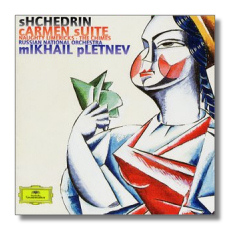
The Internet's Premier Classical Music Source
Related Links
- Latest Reviews
- More Reviews
-
By Composer
-
Collections
DVD & Blu-ray
Books
Concert Reviews
Articles/Interviews
Software
Audio
Search Amazon
Recommended Links
Site News
 CD Review
CD Review
Rodion Shchedrin

- Carmen Suite
- Naughty Limericks
- The Chimes
Russian National Orchestra/Mikhail Pletnev
Deutsche Grammophon 471136-2 DDD 61:48
Rodion Shchedrin (still alive, and approaching his 70s) wrote his Carmen Suite in 1967 for the use of his wife, the prima ballerina Maya Plisetkaya. The themes all come from Bizet's opera (with interpolations from La jolie fille de Perth and L'Arlésienne), and they are arranged by Shchedrin for an orchestra consisting only of strings and a large array of percussion. The result is a sort of classical "bachelor pad" takeover, half lurid and half disturbing, of Bizet's immortal soul. The Soviet regime sniffed suspiciously at it, both for the ballet's sexuality and its supposedly disrespectful treatment of Bizet's classic score. Dmitri Shostakovich came to its rescue, however, and the ballet eased its way into the Bolshoi Theater's repertoire. An American recording by Arthur Fiedler and the Boston Pops came along a few years later. (It was reissued in BMG's "High Performance" series a few years ago.) Since then, there have been new recordings here and there, particularly when a stereo or digital showpiece has been needed. Pletnev's new version does much to tame the score's incipient vulgarity without compromising its more grotesque elements. The relative thinness of the Russian National Orchestra's strings is a potential concern in a score that depends almost completely on strings to carry the melody, but in the long run, a less rich approach probably makes this Carmen Suite more digestible and less fattening.
Naughty Limericks and The Chimes, both around ten minutes long, are designated as "Concerti for Orchestra." The formers title, never satisfactorily translated into English, alludes to chastushki or impudent songs satirizing social or political issues. (Think of Tom Lehrer behind the Iron Curtain.) Shchedrin's work is "many variations on many themes," and its tone is brilliant and mocking, with elements of jazz, slapstick, and drunken village bands. This music allows the Russian National Orchestra more of a chance to cut loose, although Pletnev's conducting keeps matters in hand.
The Chimes was commissioned by Leonard Bernstein for the 125th anniversary of the New York Philharmonic. This is by far the most avant-garde of the three scores; it would not be atypical of Alfred Schnittke. The heavy tolling of Russian bells is evoked through sonoristic, serial writing for the orchestra. Melody is less important than the great blocks of sound which slide against each other. The Chimes, effectively realized by Pletnev and his orchestra, brings this CD to a massive conclusion.
This recording was made in the Moscow State Conservatory in February-March 1998. Its dynamic range is extremely wide – you'll be turning up your equipment to hear the opening minute of the Carmen Suite, and then you'll be jumping up to turn it down again to protect your hearing.
Copyright © 2001, Raymond Tuttle


















